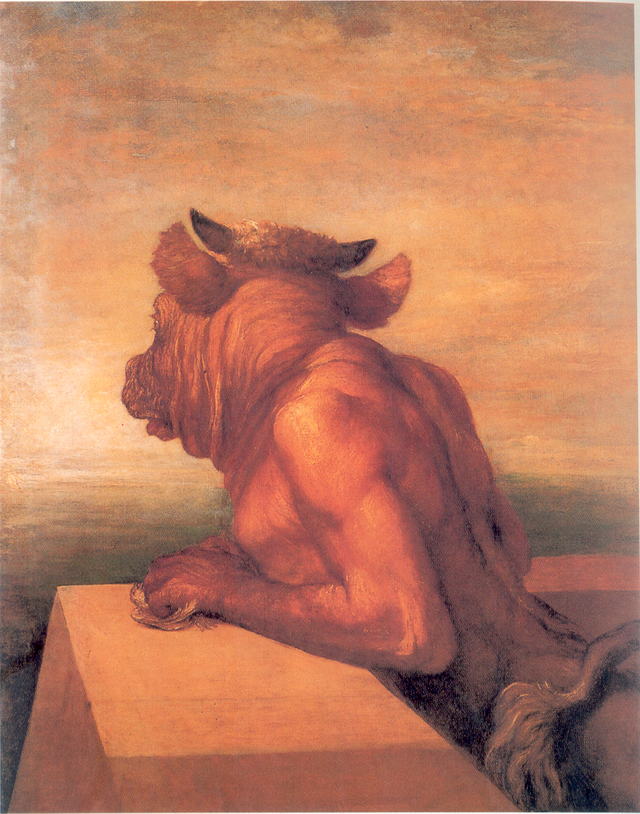The infinity of Asterion - Conclusion
With this post concludes this original analysis of the story "The house of Asterion" by Jorge Luis Borges.
CONCLUSION
The infinite can be conceived in different ways; as we have seen, it can be theorized about it under a nominalist or a realist perspective, it can be considered a mere invention of language or understood as having real existence. But whether one or the other is adopted, its full understanding is not possible for the human mind. The analysis we have made of the story has allowed us to see how this concept penetrates it from different dimensions.
Having analyzed their narrative form, we have detected different voices that appear superimposed on each other as subject to a dialogue that does not find a term; what seems to be indicating that a new argument can always be made to defend a certain position or a new reflection to object it. We discover then that the narrative structure confronts us with a nominalist posture of the concept; the infinite appears as potential, as an iterative process; there is not a single voice that contains in itself the infinite voices, but these are added in a progression that seems to have no end.
However, in the spatial dimension of the story the conception of infinity is identified with the realist notion. The concept appears in this dimension through the perception that the protagonist has of the space it occupies. We have shown in our analysis that Asterion, who is also akin to the Platonic philosophy, conceives space as a current infinite. This does not make his sense of loss diminish, but quite the opposite; the infinite that contains it leads him to desire death.
At the end of the analysis we have dealt with the temporal aspect of the story that, like the spatial one, interests us from the subjective conception of the protagonist. We have understood that in his perception time appears interrelated with space and that is why his hope of liberation from that infinite that imprisons him is set in time. However, Asterion does not understand death as the end of time, but as the passage to another place that he hopes will be more welcoming. He does not imagine then that there is an end to his temporal becoming, but that he is conceived eternally. Is for Asterion eternity a "mechanical aggregation of the past, present and future" or "the simultaneity of those times?"[15] It seems that, as a good realist, he is inclined towards the second option. Indeed, given his hope in a redeemer, we understand that he is inclined towards the idea of a Platonic eternity. But, on the other hand, we have seen that surreptitiously sneaking into the story, as possibility, the nominalist conception of eternity in the form of a cyclic eternity.
The perspective from which we have analyzed this story allows us to notice that it has been conceived with a protagonist with a realistic perception of the universe, while the presence of the narrator is identified by the nominalist traces that are in the story. Both positions appear confronting and discussing veiledly in the text. Likewise, we have been able to establish the importance of the concept of infinity for the interpretation of the story and to reach a deeper understanding of it. We know, on the other hand, that the notions here expressed have been a recurring theme in Borges and that without doubt they have been present in the elaboration of this text.
[15] With these terms, Borges defines eternity according to the nominalist and realistic conception respectively. The appointment, in J. L. Borges "History of Eternity", Taurus Books. Available in: Libros Tauro - Historia de la Eternidad
BIBLIOGRAPHY
BOOKS
- APOLODORO (1987) Biblioteca mitológica, Madrid: Akal
- BORGES, Jorge Luis (1995) El Aleph, Madrid: Alianza Editorial
- BORGES, Jorge Luis (1980) Discusión, Madrid: Alianza Editorial
- BORGES, Jorge Luis (1980) Siete noches, Madrid: Alianza Editorial
- PLATÓN (1983) El banquete - Fedón - Fedro, Buenos Aires: Hyspamérica
- REINA-VALERA (1960) La santa biblia, London: Bibles.org.uk
- REST, Jaime (1976) El laberinto del universo (Borges y el pensamiento nominalista), Buenos Aires: Fausto
- SARLO, Beatriz (1995) Borges, un escritor en las orillas, Buenos Aires: Ariel
- VERA FERNÁNDEZ DE CÓRDOBA, Francisco (2000) “Historia de la idea de infinito”, Tres obras inéditas, Badajoz: Montano
JOURNALS
- ANDERSON IMBERT, Enrique (1960) “Un cuento de Borges: «La casa de Asterión»”, Revista iberoamericana, XXV: 33-43
- BRATOSEVICH, Nicolás (1977) “El desplazamiento como metáfora en tres textos de Jorge Luis Borges”, Revista iberoamericana, XLIII: 549-560
- GALLO, Marta (1977) “Asterión, o el divino Narciso”, Revista iberoamericana, XLIII: 683-690
- HERNÁNDEZ, Juan Antonio (2000) “Biografía del infinito: la noción de transfinitud en George Cantor y su presencia en la prosa de Jorge Luis Borges”, Signos literarios y lingüísticos, II.2: 131-139
